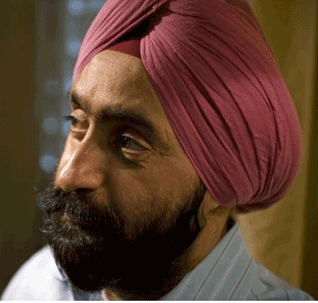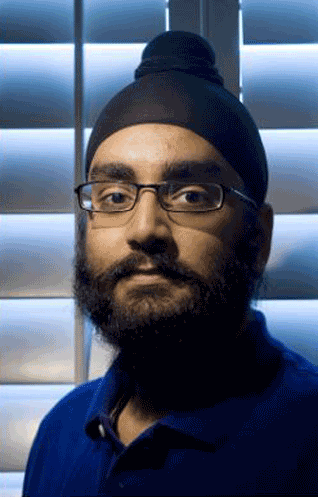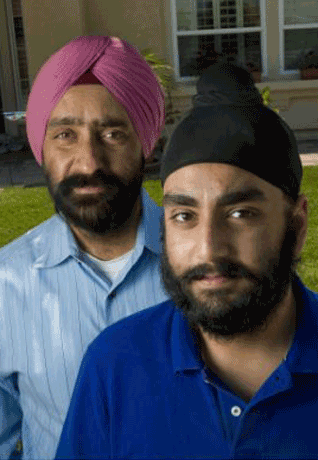Our Heroes
America's True Freedom Fighters
by DAVID WHITING
Regardless what you think of turbans, you've got to admire the Chadha family.
Father and son wear turbans everywhere. And Mom, though at time fearful for their safety, supports them.
It's not that the Chadhas want to antagonize anyone in our post 9/11 world. Far from it. It's simply that their religion, Sikhism, requires such attire.
I suppose they could deny their faith. But then they'd also be denying what the United States is about.
Freedom.
But in 21st century America, religious freedom doesn't come without a price.
•••
The Chadhas came to this country in 1998 from India, a country with a blend of faiths including Hindu, Islam, Christianity and Sikhism.
It was before India's economic boom. And, like millions of immigrants before them, Mom and Dad saw America as a land of opportunity.
Dad, Arinder Singh Chadha, arrived in the U.S. with a medical degree. Now with an MBA from UCI, he serves as associate chief medical officer at Chino State Prison.
Mom, with a son in college and a 14-year-old daughter, is a full-time homemaker and part-time volunteer. She often works at one of two gurdwaras - Sikh churches - in Orange County. One is in Santa Ana, the other in Buena Park.
When they first immigrated to the United States, they lived and worked around New York City. But life changed for the Chadhas - and other Sikhs - on September 11, 2001.
Before 9/11, Arinder Singh might get a few curious looks while wearing one of his tightly wound colorful turbans during his commute from Long Island to Manhattan. But after the hijacked jets tore into the World Trade Center, the Pentagon and a field in Pennsylvania, he saw stares of hatred.
And worse.
•••
Arinder Singh has been called a "towel head." He gets flipped off. Some shout, "Hey, Osama, go back to Iraq."
In Long Island, one kid knocked off his son's turban. School administrators, the parents say, declined to address the issue.
Ten years after 9/11, some still keep their distance, refuse to shake hands.
In June 2006, a month after the family settled into their Placentia home, someone placed an orange traffic cone on their porch and spray-painted a penis with three testicles on their driveway.
The family believes the graffiti was a reference to the informal head dress Arinder's son, Angad Singh, sometimes wears. It's a turban of sorts with a top knot that looks like a ball.
Police classified the incident as a hate crime.
The haters, of course, assumed that Angad was Muslim - not that there's anything wrong with that. A small, fanatical army of terrorists doesn't represent a faith with more than a billion followers.
But to be persecuted for someone's mistaken assumption was troubling.
Perhaps fatal.
•••
Four days after 9/11, Balbir Singh Sodhi, a Sikh-American, was gunned down at his gas station in Mesa, Arizona. It marked the beginning of the backlash.
Consider August 2008.
On August 4, Inderjit Singh Jassal was shot and killed working at a 7-11 store in Phoenix.
Four days later, a man was found beaten to death in front of a gurdwara in New York.
Eight days after that, Gurmohinder Singh was fatally shot walking into a bank in Oxnard, California.
Less than five months ago, March 4, two elderly Sikhs were fatally shot while taking a walk in Elk Grove, California.
Some Sikhs, including the Chadhas, started wearing buttons, "I'm not an Arab. I'm a Sikh. Ask me."
Sitting in the modern and minimalist living room at the Chadha home, I ask Arinder if the button is just passing on the anger and violence to someone else.
We've been talking for two hours and his every reply has been measured and quiet. But when it comes to life - and death - Arinder's tone changes. He raises his voice a notch and speaks with passion and frustration.
"We tried to be subtle for so long," Arinder explains, his face framed by a carefully groomed black beard and lavender turban. "But we don't want people dying on the streets because of a misunderstanding."
Arinder, who received an award last year from the Orange County Human Relations Commission and sits on several interfaith councils, has a point.
According to the Sikh-American Legal Defense and Education Fund, SALDEF, there are 30 million Sikhs worldwide, 500,000 in the U.S. And 99 percent of the people who wear turbans in this country are Sikh.
That's plenty of opportunity for misunderstanding.
•••
I turn to Mom, Manpreet Kaur, and ask why she doesn't ask her husband and son to give up their turbans.
With her long dark hair in a neat bun - another Sikh tenet is never to cut hair - and a sleeveless lime-green shirt, she says her reasons include tradition, faith and standing up for what is right.
Speaking of her son, now a 20-year-old senior at Northwestern University in Chicago, Manpreet says, "I was scared for him." But, she adds, fear isn't something to be ruled by.
"Like grandfather, like son; like father, like son," she says. "It's part of our religion to wear the turban."
Her words remind me of Sikh history. About 500 years ago when generally only kings and chieftains wore turbans, Sikh founders told followers to wear turbans to cover unshorn hair and as a symbol of equality and personal sovereignty.
"A big part of the religion," Manpreet says, "is instilling courage."
To help quell violence, Mom encourages her children to educate others about Sikhism. She advises: "Strike up a conversation so they're comfortable."
That's a tall order for a young teen such as their 14-year-old daughter, Simran Kaur. I ask how she handles such a parental request.
Without hesitation, Simran replies she talks about Sikhism every chance she gets.
Even one person learning could save a life.
[Courtesy: The Orange County Register. Edited for sikhchic.com]
July 13, 2011
Conversation about this article
1: Harman Singh (California, U.S.A.), July 13, 2011, 12:36 PM.
Great story! We need many more such articles of positive representation and education in the media. I congratulate David Whiting for a job well done.
2: Baldev Singh (Bradford, United Kingdom), July 13, 2011, 3:56 PM.
We have all left Punjab or have decided to live in a 'democracy' or land which values human life and dignity. We also have the greatest Ideology everin Sikhi! So we have a moral duty to tell everybody on earth about the Khalsa. Why aren't we?





